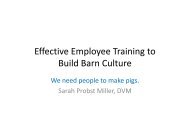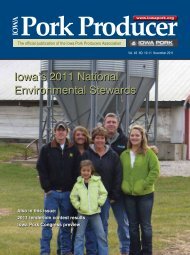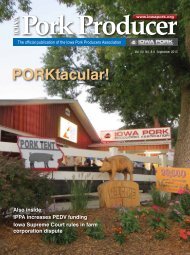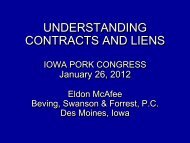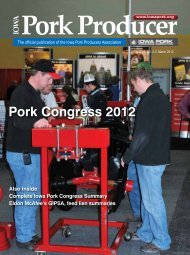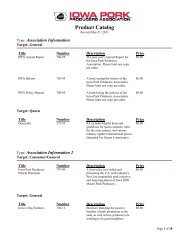Protecting Yourself Through Contracts & Liens - Iowa Pork ...
Protecting Yourself Through Contracts & Liens - Iowa Pork ...
Protecting Yourself Through Contracts & Liens - Iowa Pork ...
Create successful ePaper yourself
Turn your PDF publications into a flip-book with our unique Google optimized e-Paper software.
SWINE CONTRACTS –after 6/18/08• Packers & Stockyards requirements forproduction contracts:• Contract Producers -Right to Cancel• The later of 3 business days or any datestated in the contract• Contract must clearly disclose the right,the method and the deadline forcancelling• Additional Capital Investments• Disclosure statement on first page –additional large capital investments maybe required, if not required, can disclosethat none will be required2
SWINE CONTRACTS• Packers & Stockyards requirements:•Marketing & Production <strong>Contracts</strong> -Choice of Law and Venue•Legal forum located in theFederal judicial district in whichthe principal part of theproduction takes place•Contract may specify which statelaw applies, unless prohibited bystate law3
LIVESTOCK & POULTRYCONTRACTS – after 6/18/08• Packers & Stockyards requirements:• All Livestock or Poultry <strong>Contracts</strong> –Arbitration•Any contract requiring arbitrationmust contain a provision allowingproducer, before entering thecontract, to decline to be bound bythe arbitration provision•Contract must conspicuouslydisclose the producer’s right todecline• Also see final GIPSA rule4
CONTRACTS - GIPSA FINAL RULE• USDA Grain Inspection, Packers & StockyardsAdministration (GIPSA)• Applies to contracts “entered into, amended,altered, modified, renewed or extended” afterFeb. 7, 2012• Three areas of regulation in final rule:• Additional capital investments criteria(production contracts)• Reasonable period of time to remedy abreach of contract (production contracts)• Arbitration (production and marketingcontracts)5
CONTRACTS - GIPSA FINAL RULE• The rules do not include all criteriaGIPSA will look at to determine aviolation•Rule states these are the criteriaGIPSA may consider to determinea violation•Rule uses the term “including butnot limited to” when listing thecriteria GIPSA may consider6
DEFINITIONSAdditional capital investment:• $12,500 or more per structure paid bygrower over the life of the contractbeyond the initial investment forgrowing and raising facilities, includingcost of upgrades to structure andequipment and goods and professionalservices directly attributable toadditional cap investment• Does not include maintenance or repair7
ADD’L CAP. INVEST. CRITERIACriteria GIPSA may consider todetermine whether a requirementthat a grower must make add’lcapital invest. over the life of thecontract is a violation (includingbut not limited to):•Was grower given discretion todecide against add’l capitalinvestment8
ADD’L CAP. INVEST. CRITERIA• Was the add’l cap investmentrequirement result of coercion orretaliation, or threats of coercion orretaliation• Does other party to contract intend toreduce or substantially reduce or endproduction operations within 12months, absent a catastrophic ornatural disaster or other emergency(bankruptcy)9
ADD’L CAP. INVEST. CRITERIA• Were some growers required tomake additional cap investmentswhile others similarly situated werenot required to make the sameinvestments• The age of and recent upgrades togrower’s operations• Can the cost of the investments bereasonably expected to be recouped10
ADD’L CAP. INVEST. CRITERIA•Was grower given a reasonabletime period to implement therequired investment•Equipment changes required forequipment previously approvedand accepted if equipment isfunctioning as intended, unlessgrower is paid adequatecompensation incentives11
REASONABLE PERIOD OF TIME TOREMEDY BREACH OF CONTRACT• Criteria GIPSA may consider todetermine whether a grower has beengiven a reasonable period of time toremedy a breach of contract that couldlead to contract termination (includingbut not limited to the following but notincluding animal welfare or food safetyconcerns):• Was grower provided written notice ofthe breach upon initial discovery of thebreach12
REASONABLE PERIOD OF TIME TOREMEDY BREACH OF CONTRACT•Did the notice of breach include:•a description of the act and thesection of the contract breached•When the breach occurred•How the grower can remedy thebreach•A date that provides areasonable period of time toremedy the breach13
REASONABLE PERIOD OF TIME TOREMEDY BREACH OF CONTRACT•Did the other party take intoaccount the grower’s ongoingresponsibilities related to raisingand handling swine under theircare when setting the date toremedy a breach•Was grower given reasonabletime after the notice of breach torebut the alleged breach.14
ARBITRATIONCriteria GIPSA may consider to determine ifgrower or producer has meaningful opportunityto participate fully in arbitration process(including but not limited to):• Bold conspicuous printed clause describingthe following so that grower or producer canmake an informed decision on whether to electarbitration:• who pays arbitration costs,• the arbitration process,• any limitations on legal rights and remediesso grower can decide whether to electarbitration17
ARBITRATION• Are cost and time limits reasonable• Is there access to and opportunity toengage in reasonable discovery ofinformation held by processor orcontractor• Is arbitration used only to resolvedisputes under the contract• Is a “reasoned, written opinion basedon applicable law, legal principles andprecedent” from the arbitrator required18
LIVESTOCK FEEDINGCONTRACTS - INSURANCE• Standard farm liability policies do notnormally cover a contract feeder’sliability for livestock death loss from thecontract feeder’s negligence, etc. due tothe “care, custody or control” policyexclusion• Policy endorsements are available toprovide contract feeders with coveragefor this exclusion• Coverage for this potential liability shouldbe considered by all contract feeders19
LIVESTOCK FEEDINGCONTRACTS - INSURANCENov. 23, 2011 <strong>Iowa</strong> Appeals Court – Boelmanv. Grinnell Mutual• Boelmans purchased policy rider to covercustom feeding• Hogs fed under contract by Boelmans diedfrom suffocation• Grinnell denied coverage based on otherpolicy exclusions• Court found there was coverage notingGrinnell had “complete control over thelanguage in the policy”20
LIVESTOCK FEEDINGCONTRACTS - INSURANCEBoelman v. Grinnell Mutual“It was Grinnell Mutual’s duty to define anylimitations or exclusionary clauses in clear andexplicit terms. It could have clearly and explicitlystated in its custom feeding endorsement that,despite purchase of the endorsement, propertydamage to property in the insureds’ care,custody, or control, i.e., the pigs in this case, wasnot covered under Coverage A. It did not.Similarly, Grinnell Mutual could have clearly andexplicitly stated in the endorsement that propertydamage arising out of “custom farming” was notcovered under Coverage A-1. It did not.”21
LANDLORD’S LIEN• Landlords (farmland or livestock facilityowners renting out land or facilities)• Landlord’s lien (first priority lien oncrops and livestock)•Must file UCC-1 with Secretary ofState within 20 days after tenanttakes possession – (UCC-1 mustinclude statement that it is filed toperfect a LL’s lien)22
LANDLORD’S LIEN• Also file in any state where livestock,crops, or other collateral subject to thelien will be moved• May file after the deadline dates, butwon’t have first priority over previouslyfiled UCC-1’s• This filing does not result in thelandlord’s name on the grain or packercheck unless other steps are taken23
IOWA CONTRACT GROWERS LIEN• Production contract lien (lvstk or crops)• To have priority over prior filed UCC-1’s, must file a UCC-1:•Within 45 days after each group oflivestock is delivered at the site; or•Within 180 days after livestock isdelivered at the site if monthly ormore frequent deliveries•In determining frequency ofdelivery, each site of a pig ownerwith multiple sites is consideredseparately24
IOWA CONTRACT GROWERS LIEN• Production contract lien (livestock or crops)• May file after the deadline dates, but won’thave first priority over previously filed UCC-1’s• Also file in any state where livestock or cropwill be moved• This filing does not result in the contractfeeder’s name on the packer check unlessother steps are taken• Cash in hands of owner of livestock or cropare deemed by law to be proceeds from thesale of the livestock or crop25
IOWA AG SUPPLY DEALER LIEN• Feed, seed, chemicals, fertilizer• Lien on crops and livestock• File UCC-1 within 31 days of purchase• May file after these deadline dates, butwon’t have priority over previously filedUCC-1’s• Lien in livestock feed has priority overearlier perfected lien or security interestfor amount greater than acquisitionprice of livestock26
IOWA AG SUPPLY DEALER LIEN• Certified letter to secured parties –sufficient net worth or line of credit?• ASDL for feed: Letter to secured partiesnot required to have priority over earlierperfected lien or security interest• Other ASDLs (seed, chemicals, fert.):• Certified letter to secured partiesrequired• Equal priority to prior perfected lien orsecurity interest for27
IOWA AG SUPPLY DEALER LIEN•Also file in any state wherelivestock or crop will be moved•This filing does not result in theag supply dealer’s (e.g., feed)name on the packer checkunless other steps are taken28
IOWA AG SUPPLY DEALER LIEN• Dec. 30, 2011 <strong>Iowa</strong> Supreme Court –Oyens Feed v. Primebank• Feed dealer had priority over bank eventhough the dealer did not send certifiedletter• If certified letter requirement was meant toapply to feed liens, the law would be clearas it is for other ASDL liens• Court ruled not requiring letter made sensebecause feed is sold on an ongoing basisvs. seed, herbicides, & fertilizer• Bank still has priority for acquisition price oflivestock29
IOWA VETERINARIANS LIEN• Lien for value of treating livestock, includingproducts used, professional service renderedby the veterinarian• To have priority over prior filed UCC-1’s, mustfile a UCC-1 within 60 days of treatinglivestock• May file after the deadline dates, but won’thave first priority over previously filed UCC-1’s• Also file in any state where livestock will bemoved• This filing does not result in the vet’s name onthe packer check unless other steps are taken30
LIENS – LIVESTOCK OWNERS• Contractors (owners of livestock fedunder contract)•Owners of livestock fed undercontract by a contract feedershould consider filing a UCC-1 asa “protective filing” to providenotice to lien holders and othersthat the livestock are owned bythe contractor and not the contractfeeder31
LIENSTermination•Must terminate by filingtermination statement within 20days after written notificationfrom party named in lien, ifobligations have been paid•Good policy to terminate lienonce obligations have been paideven if written notification is notreceived from other party32
LIENSProducts sold - first priority for payment• Sales of livestock and grain• If Seller is not paid by buyer, sellermost often loses priority inlivestock/proceeds to buyer’ssecured lender (exceptions includePackers & Stockyards Act & <strong>Iowa</strong>Grain Indemnity Fund transactions(stored & cash sale grain – creditsale transactions not covered byFund))33
LIENSProducts sold - first priority for payment• Options for seller:• Obtain first priority UCC security interest inpigs in sales contract & get subordinationagreement from buyer’s secured creditor• Obtain UCC security interest in pigs insales contract and follow <strong>Iowa</strong> Coderequirements to obtain a first priority“purchase money security interest”(primarily, this involves filing a UCC-1 andnotifying buyer’s secured creditor beforethe livestock is delivered)• Letter of credit from buyer’s lender34
ENTERING INTO ORMODIFYING A CONTRACT• Read and understand before signing• Know what is required of you• Know the other party’s financial andother business history• If it is in the contract, you must do it• If it isn’t in the contract, it isn’t part ofthe agreement• Any amendments to the contract mustbe in writing and attached to thecontract35
ENTERING INTO ORMODIFYING A CONTRACT• Oral agreements are binding (in mostcases)• More difficult to prove• Hard to remember what the agreementwas• Written agreements• Most often have a provision which statesthat the written agreement supersedes allprevious oral agreements• Most often have a provision which statesthat any changes to the writtenagreement must be in writing36
ENTERING INTO ORMODIFYING A CONTRACT• Everything is negotiable, includingwhether to sign the contract• Discuss all provisions of the proposedagreement with the other party• Have the proposed agreementreviewed by consultants and legaladvisors – but know the terms yourself• Even if the other party will not change aterm –at least know their interpretation• Make it clear that there is no contractuntil everything is in writing and signedby all parties37
CONTRACT DEFAULT• Communicate with the other party• If contract requirements cannot befulfilled, let the other party know inadvance and try to negotiate aresolution• Know legal options before negotiation• If negotiation doesn’t work, be ready touse legal options• Don’t give up on negotiation, even afterlegal process started38
CONTRACT DEFAULT• Force majeure (impossibility ofperformance)• Fire, storm, government intervention,etc.• In most swine contracts, marketforces and disease are excluded• Government regulation?• Price of feed inputs?• Can’t get financing?• Basic legal standard: Economicallyburdensome is usually not enough39
CONTRACT DEFAULT• Will other party default?• Demand the other party providewritten assurance that they canperform under the contract (adequateassurance of performance)• If not provided within a reasonabletime, not to exceed 30 days, then theparty demanding the assurance ofperformance may terminate thecontract40
CONTRACT DEFAULT• Right to rebut (GIPSA rule) & cure any default• Right to correct other party’s default• Mediation required by <strong>Iowa</strong> law for livestockcare and feeding contracts• Arbitration required by contract?• Which state’s law applies? Where will courtaction or arbitration be held?• Mitigation of damages required• Damages• Money• Specific performance – court ordersdefaulting party to perform – rare41
CONTRACT DEFAULT• Pig purchase agreement - damagesfor default•Difference in sales price, plusexpenses of sale•Sale after default must be in acommercially reasonable manner– notify defaulting buyer beforesale to new buyer•File lawsuit for damages42
CONTRACT DEFAULT• Termination of contract• Only if default is material: a substantial part of thecontract or if the default substantially defeats thepurpose of a contract• Default must be total (a material default which isnot cured within a reasonable amount of timeafter notice to the other party or a material defaultwhich cannot be cured)• If a party terminates a contract for less than atotal default, the terminating party is in default ofthe contract• Does the terminating party stand to gaineconomically by terminating the contract?43
CONTRACT DEFAULT• Termination of contract• In general, under a pig purchaseagreement, a buyer’s failure to payfor one group of pigs in a multi-groupcontract is not sufficient legal basisfor a seller to terminate the contract• Likewise, in general, under aproduction contract, missing onepayment is not sufficient legal basisfor the contract feeder to terminatethe contract44




